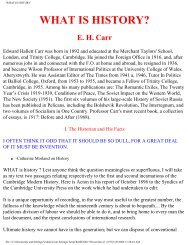The bronze age and the Celtic world - Universal History Library
The bronze age and the Celtic world - Universal History Library
The bronze age and the Celtic world - Universal History Library
You also want an ePaper? Increase the reach of your titles
YUMPU automatically turns print PDFs into web optimized ePapers that Google loves.
A RECAPITULATION 131<br />
valley, crossed <strong>the</strong> Predil pass. Some of <strong>the</strong>se stayed for a time at Santa Lucia Tolmino,<br />
in <strong>the</strong> Isonzo valley, while <strong>the</strong> majority proceeded to Cividale in <strong>the</strong> Friuh plain. <strong>The</strong>y<br />
passed on rapidly to <strong>the</strong> Po valley, <strong>and</strong> destroyed <strong>the</strong> vill<strong>age</strong>s of <strong>the</strong> Terramara-folk<br />
who Uved <strong>the</strong>re, expelling <strong>the</strong> inhabitants as seems to have been <strong>the</strong> invariable custom of<br />
<strong>the</strong>se men of blood <strong>and</strong> iron.^ <strong>The</strong> Terramara-folk fled, some to Etruria, o<strong>the</strong>rs to Taranto<br />
<strong>and</strong> o<strong>the</strong>rs again to Rome, where <strong>the</strong>y built a dry terramara on <strong>the</strong> Palatine Hill.^ <strong>The</strong><br />
iron sword people passed on <strong>and</strong> settled at <strong>the</strong> foot of <strong>the</strong> Apennines, with <strong>the</strong>ir centre<br />
at Bologna, introducing into all <strong>the</strong> region north-east of <strong>the</strong> mountains <strong>the</strong> culture<br />
known to archaeologists as that of Villa-nova.'<br />
As we have seen in Chapter IV., <strong>the</strong> Etruscans had been for some httle time<br />
settled in Tuscany, where <strong>the</strong>y had estabhshed <strong>the</strong>ir trading cities governed by rehgious<br />
magistrates. Before long <strong>the</strong>se Etruscan Prospectors found <strong>the</strong>mselves face to face<br />
with this newly-arrived war-hke people. I have already given my reasons for thinking<br />
that <strong>the</strong> ViUa-nova folk conquered <strong>the</strong> Etruscans, <strong>and</strong> that toge<strong>the</strong>r <strong>the</strong>y extended <strong>the</strong>ir<br />
empire, which is said to have reached to Pompeii. <strong>The</strong>y perhaps succeeded in pressing<br />
back <strong>the</strong> leaf-shaped sword people from <strong>the</strong> neighbourhood of Lake Trasimene, but<br />
did not apparently succeed at first in dislodging <strong>the</strong>m from <strong>the</strong> valley of <strong>the</strong> Velino.<br />
Thus we see that <strong>the</strong> leaf-shaped sword folk, mainly <strong>the</strong> people of <strong>the</strong> mountain<br />
zone, have at one time or ano<strong>the</strong>r invaded <strong>and</strong> in some way or ano<strong>the</strong>r conquered nearly<br />
aU Europe except <strong>the</strong> Iberian peninsula, while at <strong>the</strong> close of <strong>the</strong> <strong>bronze</strong> <strong>age</strong> <strong>the</strong>y<br />
arrived as refugees in <strong>Celtic</strong> l<strong>and</strong>s. <strong>The</strong> iron sword folk, <strong>the</strong> people of <strong>the</strong> plain, who<br />
had learned <strong>the</strong> use of iron in <strong>the</strong> Koban, followed <strong>the</strong>m, making a complete conquest<br />
of Greece, of Italy north of <strong>the</strong> Apennines, of France all but <strong>the</strong> west <strong>and</strong> <strong>the</strong> Seine<br />
vaUey, Belgium <strong>and</strong> perhaps o<strong>the</strong>r regions fur<strong>the</strong>r north. <strong>The</strong>se people did not conquer<br />
Sc<strong>and</strong>inavia, nor did <strong>the</strong>y reach Britain, at any rate until several more centuries had<br />
elapsed.<br />
7 Modestov (1907) 217 ; D6chelette (1908-14) ii. 529-540.<br />
8 Hooton (1913).<br />
9 D^chelette (1908-14) ii. 529-540 ; Modestov (1907) ch. viii.







